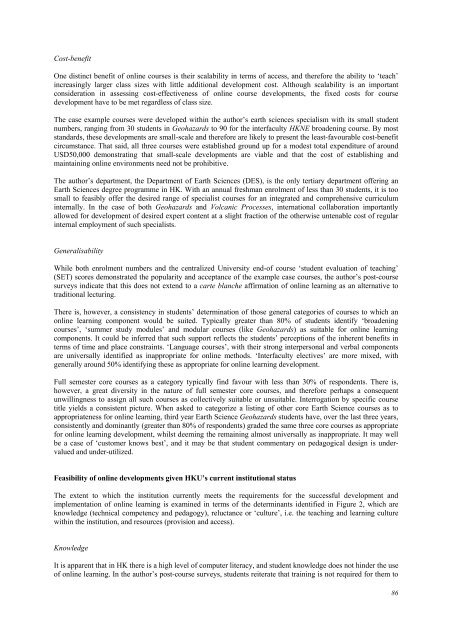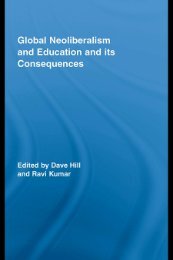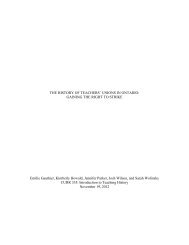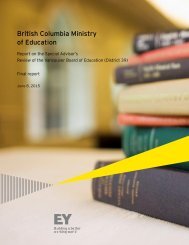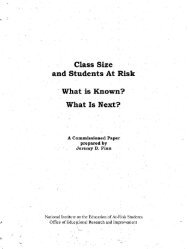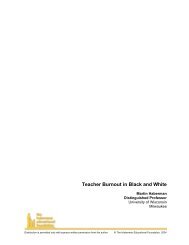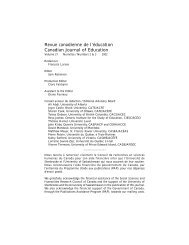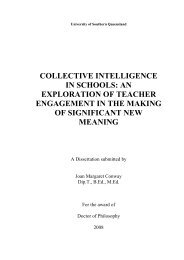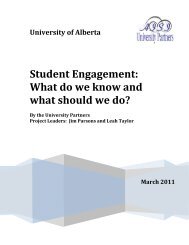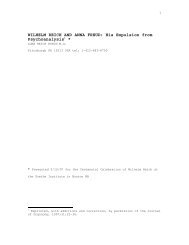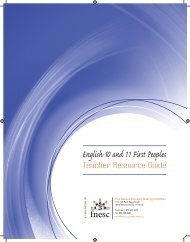October 2006 Volume 9 Number 4
October 2006 Volume 9 Number 4
October 2006 Volume 9 Number 4
Create successful ePaper yourself
Turn your PDF publications into a flip-book with our unique Google optimized e-Paper software.
Cost-benefit<br />
One distinct benefit of online courses is their scalability in terms of access, and therefore the ability to ‘teach’<br />
increasingly larger class sizes with little additional development cost. Although scalability is an important<br />
consideration in assessing cost-effectiveness of online course developments, the fixed costs for course<br />
development have to be met regardless of class size.<br />
The case example courses were developed within the author’s earth sciences specialism with its small student<br />
numbers, ranging from 30 students in Geohazards to 90 for the interfaculty HKNE broadening course. By most<br />
standards, these developments are small-scale and therefore are likely to present the least-favourable cost-benefit<br />
circumstance. That said, all three courses were established ground up for a modest total expenditure of around<br />
USD50,000 demonstrating that small-scale developments are viable and that the cost of establishing and<br />
maintaining online environments need not be prohibitive.<br />
The author’s department, the Department of Earth Sciences (DES), is the only tertiary department offering an<br />
Earth Sciences degree programme in HK. With an annual freshman enrolment of less than 30 students, it is too<br />
small to feasibly offer the desired range of specialist courses for an integrated and comprehensive curriculum<br />
internally. In the case of both Geohazards and Volcanic Processes, international collaboration importantly<br />
allowed for development of desired expert content at a slight fraction of the otherwise untenable cost of regular<br />
internal employment of such specialists.<br />
Generalisability<br />
While both enrolment numbers and the centralized University end-of course ‘student evaluation of teaching’<br />
(SET) scores demonstrated the popularity and acceptance of the example case courses, the author’s post-course<br />
surveys indicate that this does not extend to a carte blanche affirmation of online learning as an alternative to<br />
traditional lecturing.<br />
There is, however, a consistency in students’ determination of those general categories of courses to which an<br />
online learning component would be suited. Typically greater than 80% of students identify ‘broadening<br />
courses’, ‘summer study modules’ and modular courses (like Geohazards) as suitable for online learning<br />
components. It could be inferred that such support reflects the students’ perceptions of the inherent benefits in<br />
terms of time and place constraints. ‘Language courses’, with their strong interpersonal and verbal components<br />
are universally identified as inappropriate for online methods. ‘Interfaculty electives’ are more mixed, with<br />
generally around 50% identifying these as appropriate for online learning development.<br />
Full semester core courses as a category typically find favour with less than 30% of respondents. There is,<br />
however, a great diversity in the nature of full semester core courses, and therefore perhaps a consequent<br />
unwillingness to assign all such courses as collectively suitable or unsuitable. Interrogation by specific course<br />
title yields a consistent picture. When asked to categorize a listing of other core Earth Science courses as to<br />
appropriateness for online learning, third year Earth Science Geohazards students have, over the last three years,<br />
consistently and dominantly (greater than 80% of respondents) graded the same three core courses as appropriate<br />
for online learning development, whilst deeming the remaining almost universally as inappropriate. It may well<br />
be a case of ‘customer knows best’, and it may be that student commentary on pedagogical design is undervalued<br />
and under-utilized.<br />
Feasibility of online developments given HKU’s current institutional status<br />
The extent to which the institution currently meets the requirements for the successful development and<br />
implementation of online learning is examined in terms of the determinants identified in Figure 2, which are<br />
knowledge (technical competency and pedagogy), reluctance or ‘culture’, i.e. the teaching and learning culture<br />
within the institution, and resources (provision and access).<br />
Knowledge<br />
It is apparent that in HK there is a high level of computer literacy, and student knowledge does not hinder the use<br />
of online learning. In the author’s post-course surveys, students reiterate that training is not required for them to<br />
86


